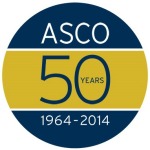 The 2014 ASCO Annual Meeting took place at the start of June in Chicago and it was a milestone year as the conference celebrated its 50th year bringing together oncology specialists from around the country.
The 2014 ASCO Annual Meeting took place at the start of June in Chicago and it was a milestone year as the conference celebrated its 50th year bringing together oncology specialists from around the country.
There were many presentations and poster sessions related to pediatric cancer — far too many to share with you here! But we do want to highlight a few that caught our eye:
- Breast Cancer Risk: This study finds that female survivors of childhood cancer have a four times greater risk of developing breast cancer compared to the general population — even if they were never treated with chest radiation. Breast cancer in this population is more likely to strike at a younger age (age 38 for childhood cancer survivors compared with 61 in the general population) and to affect both breasts. Survivors of childhood leukemias and sarcomas were at particularly elevated risk, suggesting a possible link to the p53 gene.
- Male Fertility: This study finds that there is neither a guaranteed “safe” nor “toxic” level of alkylating agent for males with childhood cancer that will absolutely determine whether their sperm counts will be normal or abnormal in adulthood. Nearly half of adult survivors had normal sperm counts approximately 20 years after treatment, but the rest had reduced sperm counts. The results suggest that other factors, including genetics, are at play. For more ASCO 2014 presentations on fertility in cancer patients, see here.
- Poor Adherence to Maintenance Meds: This study looks at some of the reasons why one in four children in remission from ALL are missing too many doses of the maintenance medication (oral 6MP) that reduces their risk of relapse. The researchers found that minority and low income families are the most vulnerable populations, requiring additional education and support. Families reported a lack of understanding of the benefits of the medication as one reason for not administering it regularly and on time.
- Secondary Thyroid Cancer: This study finds that black children treated for childhood cancer face a higher risk of developing a secondary thyroid cancer compared to white children, boys are at greater risk than girls, and younger children are at higher risk than those diagnosed after age 10. Significantly, researchers also found that this risk exists even for those who did not receive radiation as part of their treatment.
- Parental Perception of Whole Genome Sequencing: This study utilized focus groups to evaluate the knowledge level of parents of children with cancer about whole genome sequencing (WGS). Most had limited prior understanding of WGS but would be willing to participate if it posed no risk to their child. The parents stated they would want to have the test results from the WGS but they also expressed concern about the potential psychological burden of negative findings. Importantly, the parents universally believed that they would not have felt comfortable giving informed consent for WGS at the very stressful time of diagnosis. The study’s authors call for more patient education around WGS and careful consideration of the proper timing of the informed consent discussion.
Congratulations to ASCO for their 50th year improving cancer care! To search the ASCO Annual Meeting abstracts for topics of direct interest to you, visit here.

Reblogged this on HOPE ALWAYS and commented:
Important reading for my fellow cancer parents from The Children’s Cause Blog…